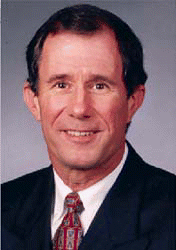As I was putting my thoughts together for this editorial, I read Peanuts in the Sunday comics, and found a great health care reform analogy. It was the annual scene of Lucy holding the football and encouraging Charlie Brown to kick it. Charlie pointed out that she has pulled it away just as he tries to kick so many times before, so why should he try again this year? Lucy responds that because she has done it so many times, the odds are now in his favor. Well, you know what happens.
Explore This Issue
December 2007One of the major issues of the 2008 presidential election appears to be health care reform. For some of our readers, the concept of health care reform is new, but for others this issue raises memories of the 1993 Clinton health plan. Students of history know that like Charlie Brown’s attempted kick, this topic has been the focus of attention several times, going back almost 100 years. May I suggest for your reading the Pulitzer Prize-winning book The Social Transformation of American Medicine by Paul Starr, from which most of the history for this editorial comes.
A Very Brief History of Health Care Reform
Theodore Roosevelt supported the concept of social insurance (including health insurance), but the election of Woodrow Wilson and the US entry into World War I returned the government to a more conservative stance on social issues with an end to this attempt at compulsory health insurance.
Franklin Roosevelt included health care reform as part of the overall social package that featured the Social Security system. However, the financial situation of the time caused the social reform movement to focus on old-age benefits and the unemployment situation. He appointed a committee to study the concept of compulsory health insurance, but the project went nowhere because there was not strong public support and it was opposed by both the American Medical Association and a conservative Congress elected in 1938.
Harry Truman proposed reforms that would have resulted in a single-payer system providing universal coverage. The plan was opposed by the AMA because it would make doctors slaves. Since this proposal was put forth in the early stages of the Cold War, the Republican-controlled Congress fought it as a communist plot.
Medicare was enacted during Lyndon Johnson’s presidency to address the issue of workers losing their employer-sponsored health care upon retirement. Although vigorously opposed by the AMA, Medicare was popular because working children frequently were saddled with their retired parents’ health care. Since the average retiree lived only a few years beyond retirement, the program made fiscal sense. However, now retirees are living longer and, with the baby boomers entering this group, Medicare funding is becoming problematic.
 As health care professionals, we need to be aware of the various proposals offered by the candidates and plug that into the calculus of how we decide to cast our votes. If a proposal is put before Congress, we need to get involved and let our representatives know what we think is right.
As health care professionals, we need to be aware of the various proposals offered by the candidates and plug that into the calculus of how we decide to cast our votes. If a proposal is put before Congress, we need to get involved and let our representatives know what we think is right.In an attempt to align incentives, in 1973 Richard Nixon signed the HMO act, which set the stage for the development of these plans. Perhaps more significant during this period is the passage of the Employee Retirement Income Security Act (ERISA), which was signed by Gerald Ford in 1974. The main focus of the measure was to protect employees’ retirement funds, but included in the law was a provision that allowed employers to establish health plans for their employees and avoid the mishmash of state laws. Employers with ERISA plans were now able to obtain clearer information about their health care expenditures, which then led employers to drive the business-like solution of managed care in the 1980s and early 1990s.
Leave a Reply